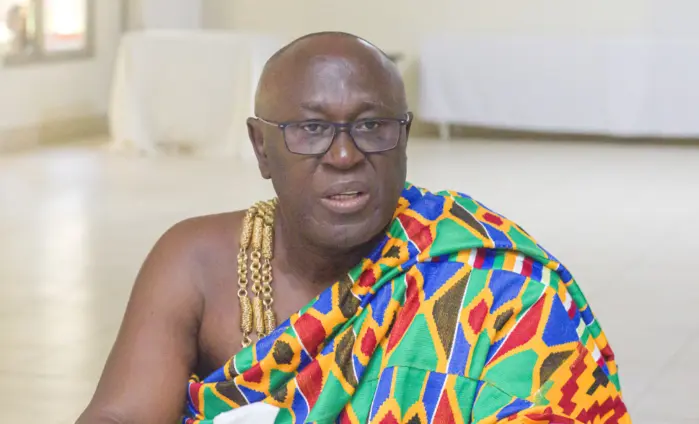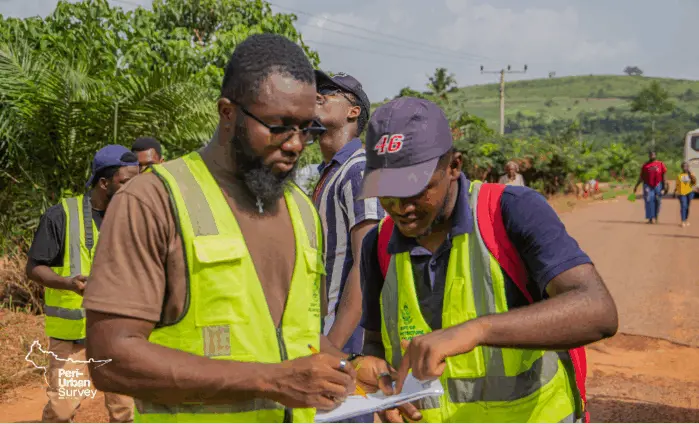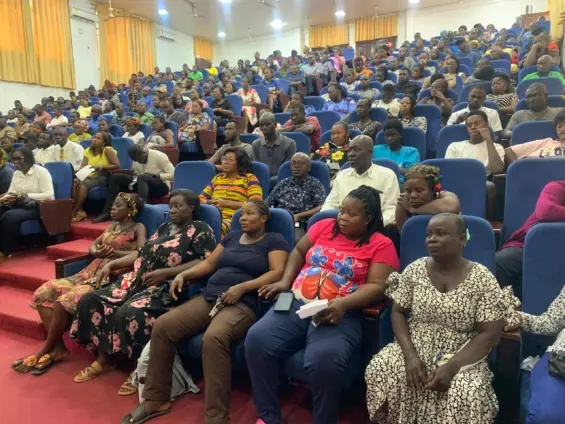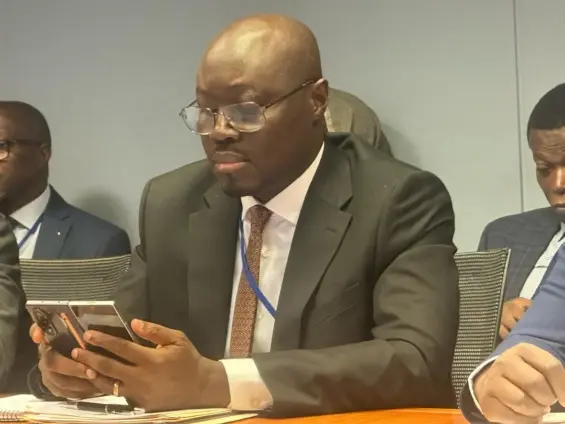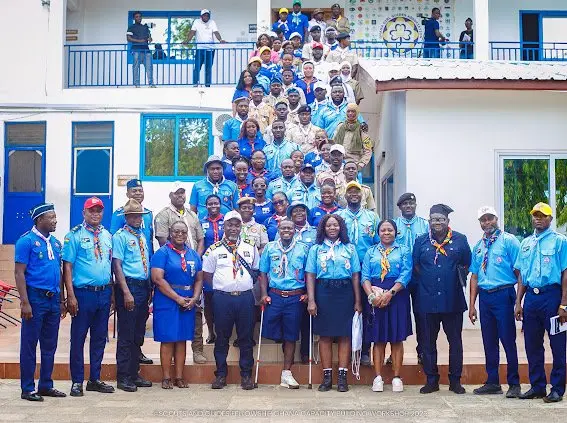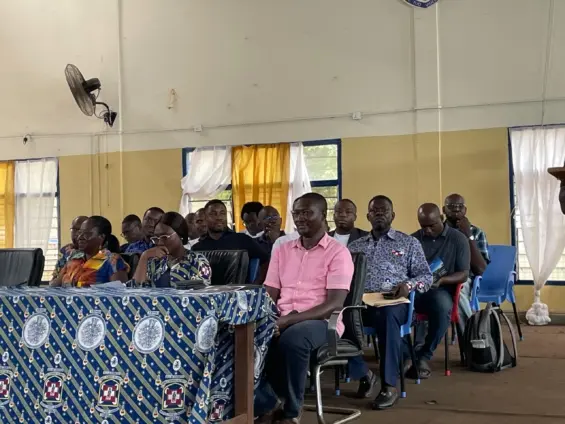Elmina, Ghana – Kwame Nkrumah University of Science and Technology (KNUST) is setting its sights on a new horizon, driven by a bold vision of global eminence. At the heart of this ambition is Akyamfoɔ Asafo Boakye Agyemang-Bonsu, the newly appointed Chairman of the Governing Council, who recently unveiled a transformative strategy during the 286th Regular Meeting of the Governing Council. The focus? Repositioning KNUST as a world-class institution synonymous with science, innovation, and inclusive leadership. This ambitious plan seeks not only to elevate KNUST‘s reputation but also to tackle pressing societal challenges and foster groundbreaking advancements, solidifying its place as a leader in African education and technology. The stakes are high, and the questions are clear: What are the core pillars of this strategy, and how will they resonate across Ghana and far beyond?
Chairman Agyemang-Bonsu has articulated five core imperatives designed to propel KNUST to the forefront of global recognition. These directives encompass a comprehensive restructuring of research methodologies, a dedicated focus on fostering innovation across disciplines, the cultivation of strategic partnerships with leading institutions worldwide, an unwavering commitment to governance excellence, and a strategic investment in high-risk research endeavors. The ultimate aim is to elevate KNUST‘s standing on the global stage, amplifying its contributions to science, technology, and the overall betterment of society.
“With these initiatives, KNUST will not only produce graduates but create solutions, industries, and prosperity for Ghana and beyond,” stated Akyamfoɔ Asafo Boakye Agyemang-Bonsu, underscoring the transformative potential of this strategic vision.
To achieve these ambitious goals, KNUST is pioneering several key initiatives. One of the most innovative is the establishment of Grand Challenge Institutes, designed to break down traditional academic silos and foster multidisciplinary collaboration.
These research hubs will bring together experts from diverse fields to collaboratively address complex societal challenges such as food security, renewable energy, and digital health.
These institutes represent a modern approach to research, one that recognizes the interconnectedness of global issues and the need for diverse perspectives to develop effective solutions. By focusing on areas such as food security, renewable energy, and digital health, KNUST aims to make tangible contributions to improving lives both locally and globally.
Beyond research, KNUST is also committed to translating its innovations into real-world impact. To this end, the university is developing what it calls an Innovation Bridge, a structured ecosystem designed to support research from its initial discovery to its ultimate application.
This would include incubation, acceleration, and venture funding components to ensure that innovations emerging from KNUST’s laboratories translate into viable products and services that benefit society and contribute to economic growth.
This comprehensive approach aims to ensure that groundbreaking research doesn’t remain confined to academic journals but instead becomes a catalyst for economic growth and societal benefit. The Innovation Bridge seeks to foster a culture of entrepreneurship and provide researchers with the resources they need to bring their ideas to market.
The pursuit of global eminence requires more than just internal initiatives. Strategic alliances with globally renowned universities and industries are also crucial. Chairman Agyemang-Bonsu emphasized the importance of these alliances, highlighting their potential for mutual growth and enhanced academic rigor.
These partnerships, he stressed, must go beyond ceremonial relationships to include joint research centers, dual degree programmes, and shared intellectual property, ensuring mutual benefit and academic depth.
Such collaborations will allow KNUST to tap into global expertise and resources, accelerating its progress toward becoming a leading center for research and innovation.
Accountability and transparency are also central to KNUST‘s vision. To ensure that the university is making progress toward its goals, a Governance Excellence Framework will be implemented. This framework will measure performance against global standards, track key metrics, and publish annual outcome reports. This commitment to evidence-based decision-making will help KNUST stay on track and continuously improve its performance.
To further stimulate groundbreaking research, KNUST is also planning to launch an Innovation Moonshot Fund. This dedicated fund will support high-risk, high-reward research ventures that are often overlooked by conventional funding sources. Examples of such projects might include the development of drought-resistant crops using gene editing, AI-powered diagnostics, and next-generation battery technology. The Innovation Moonshot Fund empowers researchers to pursue daring ideas with the potential to transform industries and address critical global challenges.
In addition to these initiatives, KNUST is also focusing on several strategic areas that are critical to its future success. The university aims to become a continental leader in areas such as artificial intelligence, green hydrogen innovation, and gender equity in science. In the field of AI, KNUST is focusing on solving real-world problems in healthcare, agriculture, and education, particularly in the Ashanti Region. The university also plans to establish West Africa’s first research and production hub for green hydrogen. Furthermore, KNUST is committed to dismantling barriers to women’s participation in STEM fields.
We must dismantle every barrier that prevents women from fully participating in scientific research and technological innovation,” declared the Council Chair.
With the current Corporate Strategic Plan set to expire in December 2025, Chairman Agyemang-Bonsu has called for the urgent development of a forward-looking blueprint for 2026–2030.
This is our opportunity to redefine what a 21st-century African university of science and technology can achieve,” said Akyamfoɔ Asafo Boakye Agyemang-Bonsu.
This new plan should build upon past successes while embracing future imperatives, ensuring that KNUST remains at the forefront of innovation and academic excellence.
KNUST‘s ambitious plan, spearheaded by Chairman Akyamfoɔ Asafo Boakye Agyemang-Bonsu, presents a clear and compelling vision for achieving global eminence. By prioritizing multidisciplinary research, fostering innovation, building strategic partnerships, and emphasizing accountability, KNUST is positioning itself to become a leading force in African education and technology. The university’s commitment to AI, green hydrogen, and gender equity further solidifies its role as a forward-thinking institution dedicated to addressing pressing global challenges. The question remains: Can KNUST‘s ambitious vision be fully realized, transforming Ghana’s technological landscape and beyond? The world watches with anticipation as KNUST embarks on this transformative journey.
Image Source: MYJOYONLINE

